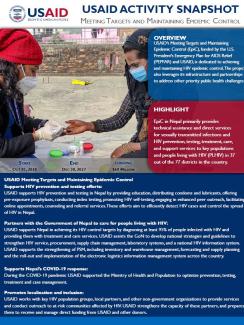START OCT 01, 2020 | END DEC 30, 2027 | FUNDING $69 MILLION
OVERVIEW
USAID’s Meeting Targets and Maintaining Epidemic Control (EpiC), funded by the U.S. President’s Emergency Plan for AIDS Relief (PEPFAR) and USAID, is dedicated to achieving and maintaining HIV epidemic control. The project also leverages its infrastructure and partnerships to address other priority public health challenges.
HIGHLIGHT
EpiC in Nepal primarily provides technical assistance and direct services for sexually transmitted infections and HIV prevention, testing, treatment, care, and support services to key populations and people living with HIV (PLHIV) in 37 START out of the 77 districts in the country.
USAID Meeting Targets and Maintaining Epidemic Control Supports HIV prevention and testing efforts:
USAID supports HIV prevention and testing in Nepal by providing education, distributing condoms and lubricants, offering pre-exposure prophylaxis, conducting index testing, promoting HIV self-testing, engaging in enhanced peer outreach, facilitating online appointments, counseling and referral services. These efforts aim to efficiently detect HIV cases and control the spread of HIV in Nepal.
Partners with the Government of Nepal to care for people living with HIV:
USAID supports Nepal in achieving its HIV control targets by diagnosing at least 95% of people infected with HIV and providing them with treatment and care services. USAID assists the GoN to develop national strategies and guidelines to strengthen HIV service, procurement, supply chain management, laboratory systems, and a national HIV information system. USAID supports the strengthening of PSM, including inventory and warehouse management, forecasting and supply planning and the roll-out and implementation of the electronic logistics information management system across the country.
Supports Nepal’s COVID-19 response:
During the COVID-19 pandemic USAID supported the Ministry of Health and Population to optimize prevention, testing, treatment and case management.
Promotes localization and inclusion:
USAID works with key HIV population groups, local partners, and other non-government organizations to provide services and conduct outreach to at-risk communities affected by HIV. USAID strengthens the capacity of these partners, and prepares them to receive and manage direct funding from USAID and other donors.


